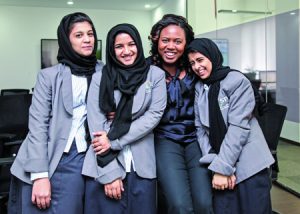An all-girls team from Secondary Technical School’s media cluster created a web series, right from scripting to editing. Some members of the team spoke to Vibhuti Arora about their experience There was a different kind of buzz around the end-of-term assignment for the media students at Secondary Technical School (STS), Ajman. The students were preparing […]

An all-girls team from Secondary Technical School’s media cluster created a web series, right from scripting to editing. Some members of the team spoke to Vibhuti Arora about their experience
There was a different kind of buzz around the end-of-term assignment for the media students at Secondary Technical School (STS), Ajman. The students were preparing to submit their projects based on a web series. It would have been a simulated project with the workflow on paper just like it has been in the past. Students develop projects on paper and are given the scores based on that, but the faculty this year decided to make it different by actually producing the proposed projects. The idea was pitched to twofour54 Creative Lab, Abu Dhabi which immediately endorsed it and offered infrastructural support for the project.
The all-girls team set out to create a web series, a phenomenon gaining popularity especially among younger viewers. The idea was to create an indigenous series for online viewing with worldwide appeal.
The process began with the shortlisting of scripts from both STS’ Ajman and Abu Dhabi campuses. The entity has facilities in both emirates. Therefore, the assignment was open to students in both campuses. Each student had to submit a script for the proposed web series, which would be produced by twofour54 and Creative Lab. The Ajman campus of STS received 60 scripts while its Abu Dhabi campus received 42, which were then cut down to the top three: Deception, Lost Crystal and Creepy Crush. Creepy Crush was chosen as the winning script.
The girls say the series is not only their way of getting a first-hand feel of a real production system but also an excellent way to take their stories to the world.
In fact, it is also a way to prove a point to those who undermine the role of the media.
Wafeer Ali, a media student from STS Ajman, who is on the production team of the webisode says: When I chose Media as my Major, many of my peers said you could do better. This goes to show that media doesnt get the importance it deserves. We are working as hard or even harder but many people deem it frivolous. Our attempt at creating this film was to prove that we are doing serious work and we have the power to reach out to the world.
English was chosen deliberately to reach out to as many audiences as possible and to tell local stories to
the world.
Creepy Crush, written by Sarah Mansoor, was chosen for its solid storyline, its creative use of character and lack of complexity to shoot.
There is a long way to turning a script from paper to screen, which students don’t normally experience, but this project gave them a chance to not only produce but to showcase it online and receive feedback from audiences.
The media programmes at STS have been designed with the objective of encouraging more Emiratis to join the media. The courses are geared around film and TV production, radio as well as lighting. The course offers all aspects of production, where the students are offered vocational training under Adveti.
Sherita Harkenss, Media Course instructor at STS Ajman, says: Its exciting to see the students graduate from a classroom environment to a professional environment. They are fortunate to have this opportunity as it will definitely help them make the right career choices. Its not only a great learning experience for them but will also give them a sense of achievement to see their own production go live.
The project was tailor-made to grade the students based on the roles they played. There are certain guidelines to follow as producer, production and direction assistants, director, editors, make-up artists, stylists, and so on.
The students were divided into two groups with three classes of 20 each and there were three producers in each class. Five students were assigned one production.
Both the Abu Dhabi and Ajman campuses were in constant touch through Google Chrome or Google Drive to work together remotely.
The shooting started in early June with intaj and Creative Lab at Arjaan Rotana Abu Dhabi premises. Some footage was also shot at intajs studios.
The girls were assigned production roles and they began training on May 27 at twofour54 Abu Dhabi. The project began with a major online marketing campaign.
Both campuses, thereafter, attended a one day editing workshop to get started on their footage. Intajs team of experienced editors helped the girls improve on their knowledge of editing.
Although the groups were based in different cities, they worked on the same project. That is how projects
are handled in modern production ecosystems where people in the production chain work from
different global locations, comments Harkness.
The two sets of footage from both the campuses were taken to the editing table at twofour54 by the editing team.
The final result was a ten-minute webisode to go online on YouTube.
The girls now plan to crowdfund their project and produce more episodes in the series.
Students take on production roles
As a producer, I was supposed to manage everything on location and make sure there were no snags. The job comes with power as well as responsibility and one has to deliver on time to ensure everything runs in perfect order, says Wafeer Ali.
Sama Al Awadh, who aspires to become a film editor in the future, says she has the skills to become
an editor.
I think I have the patience to edit. I enjoy this role because I think editing can make or break a film.
We used Adobe Premiere for the web series.
We have studied editing in class but through this project we learnt how to connect to the audience. The editors role is to present the film in the best possible way to appeal to
the audience, she says.
Another important aspect of editing, according to Awadh, is the knowledge of local laws.
As an editor, one has to be mindful of the cultural sensitivities of our society. I plan to study our censorship laws in depth later at university, she says.
Sara Mallalla, one of the students, worked as a makeup artist on the film. She worked closely with wardrobe designers and set designers as well as with the casting director.
Mallalla says: Make-up is a specialised field and getting the right look can be tricky at times. Everything has to be based on the script. I would love to work on special effects to create the look and feel
of every character to match with the costumes.
She explains that filming for the series gave her a better understanding of how make-up has to agree with
the lighting. The look of the characters varies in indoor and outdoor conditions.
Makeup can do wonders; it adds to the feel and not just the look. We worked on a shoestring budget to achieve all of this but it was great learning experience, adds Mallalla.
They said that working on the webisode has reiterated their belief in the media.
Many people consider media as easy or even unimportant. They see it as a vocation on the fringes but that’s not true. We are the most active cluster in our school. Hopefully, this will be an eye opener for those who doubt the power or the importance of films, concludes Wafeer Ali.
















































































